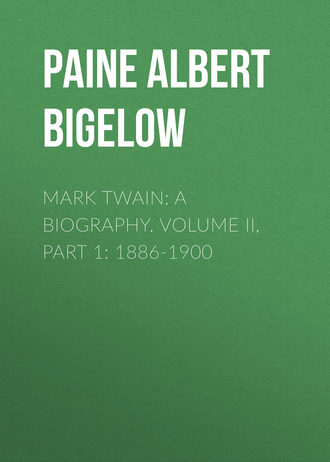
Mark Twain: A Biography. Volume II, Part 1: 1886-1900
CLIV
THE MEMOIRS OF GENERAL GRANT
The success of Huck Finn, though sufficiently important in itself, prepared the way for a publishing venture by the side of which it dwindled to small proportions. One night (it was early in November, 1884), when Cable and Clemens had finished a reading at Chickering Hall, Clemens, coming out into the wet blackness, happened to hear Richard Watson Gilder's voice say to some unseen companion:
"Do you know General Grant has actually determined to write his memoirs and publish them. He has said so to-day, in so many words."
Of course Clemens was immediately interested. It was the thing he had proposed to Grant some three years previously, during his call that day with Howells concerning the Toronto consulship.
With Mrs. Clemens, he promptly overtook Gilder and accompanied him to his house, where they discussed the matter in its various particulars. Gilder said that the Century Editors had endeavored to get Grant to contribute to their war series, but that not until his financial disaster, as a member of the firm of Grant & Ward, had he been willing to consider the matter. He said that Grant now welcomed the idea of contributing three papers to the series, and that the promised payment of five hundred dollars each for these articles had gladdened his heart and relieved him of immediate anxiety.—[Somewhat later the Century Company, voluntarily, added liberally to this sum.]
Gilder added that General Grant seemed now determined to continue his work until he had completed a book, though this at present was only a prospect.
Clemens was in the habit of calling on Grant, now and then, to smoke a cigar with him, and he dropped in next morning to find out just how far the book idea had developed, and what were the plans of publication. He found the General and his son, Colonel Fred Grant, discussing some memoranda, which turned out to be a proposition from the Century Company for the book publication of his memoirs. Clemens asked to be allowed to look over the proposed terms, and when he had done so he said:
"General, it is clear that the Century people do not realize the importance—the commercial magnitude of your book. It is not strange that this is true, for they are comparatively new publishers and have had little or no experience with books of this class. The terms they propose indicate that they expect to sell five, possibly ten thousand copies. A book from your hand, telling the story of your life and battles, should sell not less than a quarter of a million, perhaps twice that sum. It should be sold only by subscription, and you are entitled to double the royalty here proposed. I do not believe it is to your interest to conclude this contract without careful thought and investigation. Write to the American Publishing Company at Hartford and see what they will do for you."
But Grant demurred. He said that, while no arrangements had been made with the Century Company, he thought it only fair and right that they should have the book on reasonable terms; certainly on terms no greater than he could obtain elsewhere. He said that, all things being equal, the book ought to go to the man who had first suggested it to him.
Clemens spoke up: "General, if that is so, it belongs to me."
Grant did not understand until Clemens recalled to him how he had urged him, in that former time, to write his memoirs; had pleaded with him, agreeing to superintend the book's publication. Then he said:
"General, I am publishing my own book, and by the time yours is ready it is quite possible that I shall have the best equipped subscription establishment in the country. If you will place your book with my firm —and I feel that I have at least an equal right in the consideration—I will pay you twenty per cent. of the list price, or, if you prefer, I will give you seventy per cent. of the net returns and I will pay all office expenses out of my thirty per cent."
General Grant was really grieved at this proposal. It seemed to him that here was a man who was offering to bankrupt himself out of pure philanthropy—a thing not to be permitted. He intimated that he had asked the Century Company president, Roswell Smith, a careful-headed business man, if he thought his book would pay as well as Sherman's, which the Scribners had published at a profit to Sherman of twenty-five thousand dollars, and that Smith had been unwilling to guarantee that amount to the author.—[Mark Twain's note-book, under date of March, 1885, contains this memorandum: "Roswell Smith said to me: 'I'm glad you got the book, Mr. Clemens; glad there was somebody with courage enough to take it, under the circumstances. What do you think the General wanted to require of me?'
"'He wanted me to insure a sale of twenty-five thousand sets of his book.
I wouldn't risk such a guarantee on any book that was ever published.'"
Yet Roswell Smith, not so many years later, had so far enlarged his views of subscription publishing that he fearlessly and successfully invested a million dollars or more in a dictionary, regardless of the fact that the market was already thought to be supplied.]
Clemens said:
"General, I have my check-book with me. I will draw you a check now for twenty-five thousand dollars for the first volume of your memoirs, and will add a like amount for each volume you may write as an advance royalty payment, and your royalties will continue right along when this amount has been reached."
Colonel Fred Grant now joined in urging that matters be delayed, at least until more careful inquiry concerning the possibilities of publishing could be made.
Clemens left then, and set out on his trip with Cable, turning the whole matter over to Webster and Colonel Fred for settlement. Meantime, the word that General Grant was writing his memoirs got into the newspapers and various publishing propositions came to him. In the end the General sent over to Philadelphia for his old friend, George W. Childs, and laid the whole matter before him. Childs said later it was plain that General Grant, on the score of friendship, if for no other reason, distinctly wished to give the book to Mark Twain. It seemed not to be a question of how much money he would make, but of personal feeling entirely. Webster's complete success with Huck Finn being now demonstrated, Colonel Fred Grant agreed that he believed Clemens and Webster could handle the book as profitably as anybody; and after investigation Childs was of the same opinion. The decision was that the firm of Charles L. Webster & Co. should have the book, and arrangements for drawing the contract were made.
General Grant, however, was still somewhat uneasy as to the terms. He thought he was taking an unfair advantage in receiving so large a proportion of the profits. He wrote to Clemens, asking him which of his two propositions—the twenty per cent. gross-royalty or the seventy per cent. of the net profit—would be the best all around. Clemens sent Webster to tell him that he believed the simplest, as well as the most profitable for the author, would be the twenty per cent. arrangement. Whereupon Grant replied that he would take the alternative; as in that case, if the book were a failure, and there were no profits, Clemens would not be obliged to pay him anything. He could not consent to the thought of receiving twenty per cent. on a book published at a loss.
Meantime, Grant had developed a serious illness. The humiliation of his business failure had undermined his health. The papers announced his malady as cancer of the tongue. In a memorandum which Clemens made, February 26, 1885, he states that on the 21st he called at the Grant home, 3 East 66th Street, and was astonished to see how thin and weak the General looked. He was astonished because the newspaper, in a second report, had said the threatening symptoms had disappeared, that the cancer alarm was a false one.
I took for granted the report, and said I had been glad to see that news. He smiled and said, "Yes—if it had only been true."
One of the physicians was present, and he startled me by saying the General's condition was the opposite of encouraging.
Then the talk drifted to business, and the General presently said: "I mean you shall have the book—I have about made up my mind to that—but I wish to write to Mr. Roswell Smith first, and tell him I have so decided. I think this is due him."
From the beginning the General has shown a fine delicacy toward those people—a delicacy which was native to the character of the man who put into the Appomattox terms of surrender the words, "Officers may retain their side-arms," to save General Lee the humiliation of giving up his sword. [Note-book.]
The physician present was Dr. Douglas, and upon Clemens assuming that the General's trouble was probably due to smoking, also that it was a warning to those who smoked to excess, himself included, Dr. Douglas said that General Grant's affliction could not be attributed altogether to smoking, but far more to his distress of mind, his year-long depression of spirit, the grief of his financial disaster. Dr. Douglas's remark started General Grant upon the subject of his connection with Ward, which he discussed with great freedom and apparent relief of mind. Never at any time did he betray any resentment toward Ward, but characterized him as one might an offending child. He spoke as a man who has been deeply wronged and humiliated and betrayed, but without a venomous expression or one with revengeful nature. Clemens confessed in his notes that all the time he himself was "inwardly boiling—scalping Ward—flaying him alive —breaking him on the wheel—pounding him to a jelly."
While he was talking Colonel Grant said:
"Father is letting you see that the Grant family are a pack of fools, Mr.
Clemens."
The General objected to this statement. He said that the facts could be produced which would show that when Ward laid siege to a man he was pretty certain to turn out to be a fool; as much of a fool as any of the Grant family. He said that nobody could call the president of the Erie Railroad a fool, yet Ward had beguiled him of eight hundred thousand dollars, robbed him of every cent of it.
He cited another man that no one could call a fool who had invested in Ward to the extent of half a million. He went on to recall many such cases. He told of one man who had come to the office on the eve of departure for Europe and handed Ward a check for fifty thousand dollars, saying:
"I have no use for it at present. See what you can do with it for me."
By and by this investor, returning from Europe, dropped in and said:
"Well, did anything happen?"
Ward indifferently turned to his private ledger, consulted it, then drew a check for two hundred and fifty thousand dollars, and handed it over, with the casual remark:
"Well, yes, something happened; not much yet—a little too soon."
The man stared at the check, then thrust it back into Ward's hand. "That's all right. It's plenty good enough for me. Set that hen again," and left the place.
Of course Ward made no investments. His was the first playing on a colossal scale of the now worn-out "get rich quick" confidence game. Such dividends as were made came out of the principal. Ward was the Napoleon of that game, whether he invented it or not. Clemens agreed that, as far as himself or any of his relatives were concerned, they would undoubtedly have trusted Ward.
Colonel Grant followed him to the door when he left, and told him that the physicians feared his father might not live more than a few weeks longer, but that meantime he had been writing steadily, and that the first volume was complete and fully half the second. Three days later the formal contract was closed, and Webster & Co. promptly advanced. General Grant ten thousand dollars for imminent demands, a welcome arrangement, for Grant's debts and expenses were many, and his available resources restricted to the Century payments for his articles.
Immediately the office of Webster & Co. was warm with affairs. Reporters were running hot-foot for news of the great contract by which Mark Twain was to publish the life of General Grant. No publishing enterprise of such vast moment had ever been undertaken, and no publishing event, before or since, ever received the amount of newspaper comment. The names of General Grant and Mark Twain associated would command columns, whatever the event, and that Mark Twain was to become the publisher of Grant's own story of his battles was of unprecedented importance.
The partners were sufficiently occupied. Estimates and prices for vast quantities of paper were considered, all available presses were contracted for, binderies were pledged exclusively for the Grant book. Clemens was boiling over with plans and suggestions for distribution. Webster was half wild with the tumult of the great campaign. Applications for agencies poured in.
In those days there were general subscription agencies which divided the country into districts, and the heads of these agencies Webster summoned to New York and laid down the law to them concerning the new book. It was not a time for small dealings, and Webster rose to the occasion. By the time these men returned to their homes they had practically pledged themselves to a quarter of a million sets of the Grant Memoirs, and this estimate they believed to be conservative.
Webster now moved into larger and more pretentious quarters. He took a store-room at 42 East 14th Street, Union Square, and surrounded himself with a capable force of assistants. He had become, all at once, the most conspicuous publisher in the world.
CLV
DAYS WITH A DYING HERO
The contract for the publication of the Grant Life was officially closed February 27, 1885. Five days later, on the last day and at the last hour of President Arthur's administration, and of the Congress then sitting, a bill was passed placing Grant as full General, with full pay, on the retired army list. The bill providing for this somewhat tardy acknowledgment was rushed through at the last moment, and it is said that the Congressional clock was set back so that this enactment might become a law before the administration changed.
Clemens was with General Grant when the news of this action was read to him. Grant had greatly desired such recognition, and it meant more to him than to any one present, yet Clemens in his notes records:
Every face there betrayed strong excitement and emotion except one —General Grant's. He read the telegram, but not a shade or suggestion of a change exhibited itself in his iron countenance. The volume of his emotion was greater than all the other emotions there present combined, but he was able to suppress all expression of it and make no sign.
Grant's calmness, endurance, and consideration during these final days astonished even those most familiar with his noble character. One night Gerhardt came into the library at Hartford with the announcement that he wished to show his patron a small bust he had been making in clay of General Grant. Clemens did not show much interest in the prospect, but when the work was uncovered he became enthusiastic. He declared it was the first likeness he had ever seen of General Grant that approached reality. He agreed that the Grant family ought to see it, and that he would take Gerhardt with him next day in order that he might be within reach in case they had any suggestions. They went to New York next morning, and called at the Grant home during the afternoon.
From the note-book:
Friday, March 20, 1885. Gerhardt and I arrived at General Grant's about 2.30 P.m. and I asked if the family would look at a small clay bust of the General which Gerhardt had made from a photograph. Colonel Fred and Jesse were absent to receive their sister, Mrs. Sartoris, who would arrive from Europe about 4.30; but the three Mrs. Grants examined the work and expressed strong approval of it, and also great gratification that Mr. Gerhardt had undertaken it. Mrs. Jesse Grant had lately dreamed that she was inquiring where the maker of my bust could be found (she had seen a picture of it in Huck Finn, which was published four weeks ago), for she wanted the same artist to make one of General Grant. The ladies examined the bust critically and pointed out defects, while Gerhardt made the necessary corrections. Presently Mrs. General Grant suggested that Gerhardt step in and look at the General. I had been in there talking with the General, but had never thought of asking him to let a stranger come in. So Gerhardt went in with the ladies and me, and the inspection and cross-fire began: "There, I was sure his nose was so and so," and, "I was sure his forehead was so and so," and, "Don't you think his head is so and so?" And so everybody walked around and about the old hero, who lay half reclining in his easy chair, but well muffled up, and submitting to all this as serenely as if he were used to being served so. One marked feature of General Grant's character is his exceeding gentleness, goodness, sweetness. Every time I have been in his presence—lately and formerly—my mind was drawn to that feature. I wonder it has not been more spoken of.
Presently he said, let Gerhardt bring in his clay and work there, if Gerhardt would not mind his reclining attitude. Of course we were glad. A table for the bust was moved up in front of him; the ladies left the room; I got a book; Gerhardt went to work; and for an hour there was perfect stillness, and for the first time during the day the General got a good, sound, peaceful nap. General Badeau came in, and probably interrupted that nap. He spoke out as strongly as the others concerning the great excellence of the likeness. He had some sheets of MS. in his hand, and said, "I've been reading what you wrote this morning, General, and it is of the utmost value; it solves a riddle that has puzzled men's brains all these years and makes the thing clear and rational." I asked what the puzzle was, and he said, "It was why Grant did not immediately lay siege to Vicksburg after capturing Port Hudson" (at least that is my recollection, now toward midnight, of General Badeau's answer).
The little bust of Grant which Gerhardt worked on that day was widely reproduced in terra-cotta, and is still regarded by many as the most nearly correct likeness of Grant. The original is in possession of the family.
General Grant worked industriously on his book. He had a superb memory and worked rapidly. Webster & Co. offered to supply him with a stenographer, and this proved a great relief. Sometimes he dictated ten thousand words at a sitting. It was reported at the time, and it has been stated since, that Grant did not write the Memoirs himself, but only made notes, which were expanded by others. But this is not true. General Grant wrote or dictated every word of the story himself, then had the manuscript read aloud to him and made his own revisions. He wrote against time, for he knew that his disease was fatal. Fortunately the lease of life granted him was longer than he had hoped for, though the last chapters were written when he could no longer speak, and when weakness and suffering made the labor a heavy one indeed; but he never flinched or faltered, never at any time suggested that the work be finished by another hand.
Early in April General Grant's condition became very alarming, and on the night of the 3d it was believed he could not live until morning. But he was not yet ready to surrender. He rallied and renewed his task; feebly at first, but more perseveringly as each day seemed to bring a little added strength, or perhaps it was only resolution. Now and then he appeared depressed as to the quality of his product. Once Colonel Fred Grant suggested to Clemens that if he could encourage the General a little it might be worth while. Clemens had felt always such a reverence and awe for the great soldier that he had never dreamed of complimenting his literature.
"I was as much surprised as Columbus's cook could have been to learn that Columbus wanted his opinion as to how Columbus was doing his navigating."
He did not hesitate to give it, however, and with a clear conscience. Grant wrote as he had fought; with a simple, straightforward dignity, with a style that is not a style at all but the very absence of it, and therefore the best of all literary methods. It happened that Clemens had been comparing some of Grant's chapters with Caesar's Commentaries, and was able to say, in all sincerity, that the same high merits distinguished both books: clarity of statement, directness, simplicity, manifest truthfulness, fairness and justice toward friend and foe alike, soldierly candor and frankness, and soldierly avoidance of flowery speech.
"I placed the two books side by side upon the same level," he said, "and I still think that they belong there. I learned afterward that General Grant was pleased with this verdict. It shows that he was just a man, just a human being, just an author."
Within two months after the agents had gone to work canvassing for the Grant Memoirs—which is to say by the 1st of May, 1885—orders for sixty thousand sets had been received, and on that day Mark Twain, in his note-book, made a memorandum estimate of the number of books that the country would require, figuring the grand total at three hundred thousand sets of two volumes each. Then he says:
If these chickens should really hatch according to my account, General Grant's royalties will' amount to $420,000, and will make the largest single check ever paid an author in the world's history. Up to the present time the largest one ever paid was to Macaulay on his History of England, L20,000. If I pay the General in silver coin at $12 per pound it will weigh seventeen tons.
Certainly this has a flavor in it of Colonel Sellers, but we shall see by and by in how far this calculation was justified.
Grant found the society of Mark Twain cheering and comforting, and Clemens held himself in readiness to go to the dying man at call. On the 26th of May he makes this memorandum:
It is curious and dreadful to sit up in this way and talk cheerful nonsense to General Grant, and he under sentence of death with that cancer. He says he has made the book too large by 200 pages—not a bad fault. A short time ago we were afraid we would lack 400 of being enough.
To-day talked with General Grant about his and my first great Missouri campaign in 1861. He surprised an empty camp near Florida, Missouri, on Salt River, which I had been occupying a day or two before. How near he came to playing the devil with his future publisher.
Of course Clemens would amuse the old commander with the tale of his soldiering, how his company had been chased through the brush and mud by the very announcement that Grant was coming. Some word of this got to the Century editors, who immediately proposed that Mark Twain contribute to the magazine War Series the story of his share in the Rebellion, and particularly of his war relations with General Grant. So the "Private History of a Campaign that Failed" was prepared as Mark Twain's side-light on the history of the Rebellion; and if it was not important history it was at least amusing, and the telling of that tale in Mark Twain's inimitable fashion must have gone far toward making cheerful those last sad days of his ancient enemy.
During one of their talks General Grant spoke of the question as to whether he or Sherman had originated the idea of the march to the sea. Grant said:
"Neither of us originated the idea of that march. The enemy did it."
Reports were circulated of estrangements between General Grant and the Century Company, and between Mark Twain and the Century Company, as a result of the book decision. Certain newspapers exploited and magnified these rumors—some went so far as to accuse Mark Twain of duplicity, and to charge him with seeking to obtain a vast fortune for himself at the expense of General Grant and his family. All of which was the merest nonsense. The Century Company, Webster & Co., General Grant, and Mark Twain individually, were all working harmoniously, and nothing but the most cordial relations and understanding prevailed. As to the charge of unfair dealing on the part of Mark Twain, this was too absurd, even then, to attract more than momentary attention. Webster & Co., somewhat later in the year, gave to the press a clear statement of their publishing arrangement, though more particularly denying the report that General Grant had been unable to complete his work.









